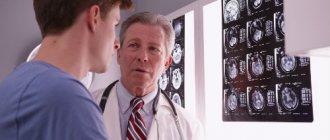Typically, dizziness, loss of balance, and loss of orientation are symptoms of a simple disease that is easily treatable. Much less often, stroke and severe genetic diseases can manifest themselves this way. But even in the first case, if the doctor does not make the correct diagnosis and starts the wrong treatment, the patient’s quality of life will greatly deteriorate. What to do if you feel dizzy?
You can suspect a diagnosis of dizziness based on the description of the symptoms. There are two types of such complaints:
- Real dizziness, when there is an illusion that everything around is starting to spin (systemic dizziness, vertigo). In this case, certain head movements provoke dizziness. Nystagmus (involuntary oscillatory eye movements) can also be noticed in a person; sometimes this requires special studies. Vertigo also makes it difficult to stay in a straight, upright position when walking or standing. There are three main diseases, the main symptom of which is systemic dizziness:
- benign paroxysmal positional vertigo;
- Meniere's disease;
- vestibular neuronitis.
In none of these situations, the cause of dizziness can be osteochondrosis of the cervical spine, although often this diagnosis can be heard at a doctor’s appointment. Throughout the civilized world they know that degenerative changes in the intervertebral discs (which, in essence, is osteochondrosis) very rarely cause any symptoms - most often you should look for some other disease. Also in Russia they like to diagnose vertebrobasilar (vascular) insufficiency and call it the cause of dizziness. However, vascular problems actually very rarely cause these symptoms.
Distinctive signs of dizziness
The content of the article
Dizziness can occur for various reasons. If it occurs only once, it may indicate poor health, which will pass after some time. In the case when such a symptom occurs repeatedly, a mandatory consultation with the attending physician and a more comprehensive examination is required to determine the cause of the negative symptoms.
If a patient experiences dizziness when taking a horizontal position, this may indicate pathological changes in his body, which are very important to identify in a timely manner and begin to treat correctly. In a supine position, this condition is detected by the following signs:
- a feeling of the movement of things around, a change in the spatial position of the ceiling or walls;
- very often, with regular attacks, a person experiences a persistent feeling of anxiety before going back to bed;
- a feeling of rotation of one’s own body (sometimes it haunts a person even at night), begins to feel sick when lying down;
- Vomiting and pain in the head appear.
In addition, the attack may intensify with a change in position - turning the head, a sudden change in body position. Increasing the symptom can provoke increased weakness, which haunts the person throughout the day.
Mechanism of occurrence
According to the mechanism of occurrence, dizziness is divided into systemic - associated with the vestibular apparatus, which is responsible for balance, and non-systemic, that is, non-vestibular. Most often the condition belongs to the second type. Such dizziness occurs due to changes in pressure, including when a person lies for a long time and then suddenly begins to move. It is benign and does not belong to pathologies.
True dizziness occurs due to irritation of the vestibular apparatus. It is divided into peripheral and central. The first includes all cases of damage directly to the organs of the vestibular apparatus. This also includes the accumulation of fluid in the labyrinth of the inner ear. The cause of central vertigo is damage to the nerve fibers of the brain responsible for the functioning of the vestibular system.
Main types of illness
A healthy person may become dizzy when exposed to a strong external irritant. Malaise can occur while skating or a carousel, while the human body cannot independently control the force of rotation. Dizziness can be divided into the following forms:
- Vestibular (otherwise known as vertigo). This form of dizziness is called true, in this case a person feels the movement of all objects that are near him, in some cases you can feel the movement of your body.
- Collaptoid. Occurs when there is a sudden change in body position or pressure that is applied to the head. At this moment, a person has a desire to take a horizontal pose as soon as possible.
- Age. Occurs in older people due to imbalance. In this case the symptom is not true.
- Conditions that are often confused with dizziness (severe fatigue, stress, neurological problems, etc.). In this case, the patient begins to complain of characteristic pain in the heart and fear of dizziness.
When to see a doctor
You need to make an appointment with a neurologist if you are faced with:
- the illusion of rotation of objects around you;
- a feeling of incorrect position of your own body;
- increased sweating;
- panic fear;
- flickering of flies, sparks, darkening in the eyes;
- feeling of lack of air;
- a strange feeling of emptiness and lightness in the head, a complete absence of thoughts;
- numbness of part of the face;
- unsteadiness of gait;
- ringing in the ears, sudden deterioration of hearing.
Even if you experience mild dizziness, you should consult a doctor. Treatment is more effective in the early stages of the disease.
Reasons for the occurrence of the violation
If a person suddenly begins to feel dizzy, then he needs to change his position to horizontal as soon as possible. Most often, after this, unpleasant symptoms quickly disappear, fear goes away, and consciousness becomes clear.
Severe dizziness in a lying position may indicate particularly dangerous disorders in the patient’s body. Factors in the development of this condition may be:
- Arterial hypertension. The disease is accompanied by an increase in blood pressure, especially in the morning, when a person experiences a surge in hormonal activity. Indicators exceeding 170/100 millimeters of mercury cause ischemia of the brain centers and heart.
- Osteocondritis of the spine. With this disease, the nutrition of the intervertebral discs deteriorates, which results in a change in their elasticity.
- Mier's disease occurs due to ischemia of the structure of the inner ear, vestibular, and also the auditory nerve. In this case, the patient complains of gagging, dizziness and lack of coordination in space.
- Internal otitis (labyrinthitis), ear injuries. In this case, there is a disruption in the conduction of impulses to the vestibular centers. Even when the patient is in a horizontal position, there is a feeling of pain in the ears, nausea and dizziness before the eyes.
- Brain tumors, classified as malignant and benign, provoke tissue compression. The patient experiences severe pain in the head, vomiting, and decreased visual acuity. Dizziness usually occurs at night. You feel dizzy when lying on your back, and there is a feeling of a change in body position.
- The use of sedatives and sleeping pills often negatively affects the functioning of the brain. This is especially pronounced in women, who are characterized by a surge in hormone levels. After waking up, a person has a feeling of nausea, dizziness begins and the focus of the gaze on a certain object is impaired.
- In first-degree diabetes mellitus, the patient's blood vessels supplying blood to the brain become severely swollen. A sharp increase in blood glucose can cause lethargy, nervousness, and in some cases dizziness.
- If a traumatic brain injury has recently been sustained, the patient may complain of headaches, decreased vision and temporary seizures. If the damage affects the vestibular system or leads to increased intracranial pressure, the person may experience nausea, dizziness, and vomiting, after which the condition does not improve.
Doctors recommend that if you feel dizzy in the morning, do not get out of bed abruptly. During an attack, you need to calm down. To do this, close your eyes and begin to breathe deeply, pressing your thumbs on your eyeballs for 10-15 seconds.
The head may begin to spin due to other diseases, so it is very important to consult your doctor in advance to diagnose and find out the cause of the ailment. Only through special research and testing can you determine exactly what exactly provokes dizziness in a horizontal position.
To diagnose a patient, doctors use various blood tests, vascular Dopplerography, MRI, X-rays and some other studies.
To make a correct diagnosis, a specialist must find out exactly how the attack proceeds, whether the person’s condition changes during this, and whether there are additional symptoms (weakness, painful feelings, hearing loss, tinnitus and other problems).
That is why it is very important to monitor what feelings the patient experiences when dizzy. This will help to correctly and quickly determine the cause of the disease and prescribe adequate treatment.
BPPV
BPPV is diagnosed in 17% of patients complaining of dizziness and is the most common cause of its occurrence. Moreover, the frequency of its occurrence increases in proportion to age, and in women it occurs 2 times more often. This is a disease in which otoliths move into the semicircular canals of the inner ear.
Otoliths are calcium carbonate crystals normally located in the otolithic membrane of the inner ear.
With BPPV, attacks are usually triggered by head movements, especially at night, when the patient cannot control himself. There are frequent situations when dizziness occurs after turning in a dream or getting up/getting out of bed. In this case, dizziness begins acutely, but lasts less than a minute, although it may be accompanied by nausea and vomiting, nystagmus. It is not associated with hearing loss, noise, or ringing in the ears.
The duration of the attack usually does not exceed several minutes.
In most cases, the causes of BPPV cannot be determined. Only in certain situations is its development associated with head injuries, ear surgeries, or previous diseases of the inner ear.
But on the other hand, BPPV does not require specific treatment and, as a rule, goes away on its own in a few weeks or months. Patients are only taught special maneuvers to facilitate the release of particles from the affected semicircular canal to eliminate dizziness. But before they are carried out, it is imperative to consult a doctor who will confirm or deny the presence of BPPV and determine its type. Otherwise, as well as if the technique is violated, your condition may worsen.
There are more than 5 different maneuvers to relieve an attack of dizziness due to BPPV. The choice of which one will be most effective for an individual patient depends on which part of the labyrinthitis his otoliths move to. In most cases, the Eple maneuver is recommended. Its essence is as follows:
- turn the head 45° towards the affected ear and lie on your back (this may be accompanied by increased dizziness);
- the head is turned sharply towards the healthy ear so that it is at an angle of 45°;
- continue turning to the healthy side with the whole body so that at the end point the face is directed downward;
- rise to a sitting position, maintaining a head tilt of 45°.
You should remain in each position for about 1 minute, and change them as abruptly as possible.
In half of the cases, correct implementation of therapeutic maneuvers allows for long-term elimination of BPPV symptoms. Although 25-50% of patients experience relapses. In such situations, repeated maneuvers are indicated.
Providing assistance at home
If dizziness bothers you regularly, you need to contact a neurologist who will find out the cause of the problem and help eliminate it. Before visiting a doctor, you can try to get rid of dizziness during sleep using several traditional medicine methods. These include:
- light massage of the neck and scalp;
- performing regular breathing exercises for two minutes (to do this, place a hand on your stomach and begin breathing slowly through your mouth, while you need to inflate your stomach as much as possible when you inhale and draw it in when you exhale);
- pressing the center of the forehead with your fingertips for several seconds (about ten);
- ventilation of the apartment;
- getting rid of tight clothes (they should be unbuttoned or removed);
- Avoid sudden body movements, including sudden turns of the head. You need to take a vertical position carefully, without rushing.
Changing your lifestyle can significantly improve the patient’s condition and even cure dizziness. That is why experts advise normalizing your diet, following a daily routine (it is very important to distinguish between rest and sleep time), taking active walks in the fresh air for at least an hour every day, and conducting therapeutic exercises.
These measures have a therapeutic effect for any pathologies that provoke dizziness. Their regular adherence will help a person prevent the progression of the disease and reduce the symptoms of vertigo.
If, despite following all the advice of a specialist, the head continues to feel dizzy, leading to further deterioration of the patient’s condition, it is necessary to immediately call an ambulance.
Prevention
- Elimination of provoking factors, vestibular rehabilitation.
- Treatment of arterial hypertension, diabetes mellitus, fight against hypercholesterolemia.
- Normalization of weight.
- Diagnosis of brain diseases in the early stages of development.
- Quitting smoking and alcoholic beverages.
- Minimizing caffeine and salt intake.
- Regular physical exercise, visiting the pool.
- Complete nutrition.
- Maintaining a daily routine with adequate sleep at night.
- Elimination of excessive physical and mental stress.
Treatment of discomfort
There is no need to self-diagnose and try to determine why your head hurts and feels dizzy. Only the attending physician will be able to correctly determine the cause of the ailment and prescribe the correct treatment to the patient.
Therapy for the disease directly depends on the characteristics of its course. Dizziness cannot be treated on its own - in order to get rid of this unpleasant symptom, it is imperative to identify the main cause of its occurrence and eliminate it as soon as possible. Treatment of the disease may include both non-drug treatment methods and medications:
- Carrying out manual therapy. It is very important that such therapy is carried out only by a professional specialist, otherwise it will be difficult to avoid complications.
- Reflexology and physiotherapy. In reflexology, the doctor performs acupuncture, which is especially effective for certain types of pathologies.
- Application of the Shants splint.
- Health-improving physical education.
- Use of medications. Depending on the type of lesion, medications may be prescribed to improve brain function, strengthen the walls of blood vessels, etc.
In severe cases, the specialist prescribes therapy from several methods to the patient at once. This treatment allows you to get faster results in the fight against pathology.
The development of dizziness in a horizontal position may directly indicate the presence of a serious illness. Therefore, it is very important to consult a doctor at the initial stage of pathology and carry out a comprehensive diagnosis to find out its causes.
Self-medication in this case can lead to serious problems - the real disease will begin to progress noticeably, and the patient’s condition will only worsen.
Diagnostics
The doctor will carefully question the patient about how and when the disease began. How often does vertigo appear, what symptoms are it accompanied by, how quickly does it go away. Then he will check the presence and nature of nystagmus, the ability to maintain balance, and evaluate the characteristics of walking. Conduct several positional tests:
- Romberg,
- Dix-Hallpike,
- Halmagi-Kertoiza;
- Marching;
- Orthostatic.
Prescribe an instrumental examination:
- CT, MRI, MR angiography of cerebral vessels;
- duplex scanning of brain and neck vessels;
- EEG
- Consultation with an otolaryngologist, cardiologist;
- Stabilography – assessment of involuntary reflexes using a moving platform.
Carrying out therapeutic exercises
To protect yourself from dizziness and increase the body's resistance to disease, you should perform some sets of exercises:
- Close your eyes and try to draw a circle with them. Sessions last for several minutes before going to bed and after waking up. The exercise is performed while lying on your back.
- Smooth movements of the head from side to side for several minutes help strengthen the vestibular system and prevent feelings of nausea.
- Pressing your fingers on the eyes helps eliminate vomiting and vertigo.
Dizziness while lying down can occur at different ages. Since this ailment can be provoked by various reasons, the patient needs to seek help from an experienced specialist as quickly as possible, who will carry out the necessary diagnostics and prescribe treatment.
ONLINE REGISTRATION at the DIANA clinic
You can sign up by calling the toll-free phone number 8-800-707-15-60 or filling out the contact form. In this case, we will contact you ourselves.
Principles of therapy
Since dizziness is not considered an independent disease, the choice of the correct treatment tactics is determined by the specific cause that caused the symptom. As a rule, a timely diagnosis allows dizziness to be completely eliminated or the condition to be prevented from worsening. The key to success in this case will be a timely and accurate diagnosis, taking into account the individual characteristics of the patient’s body, selecting the right treatment program with the prescription of effective medications.










